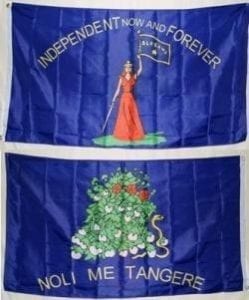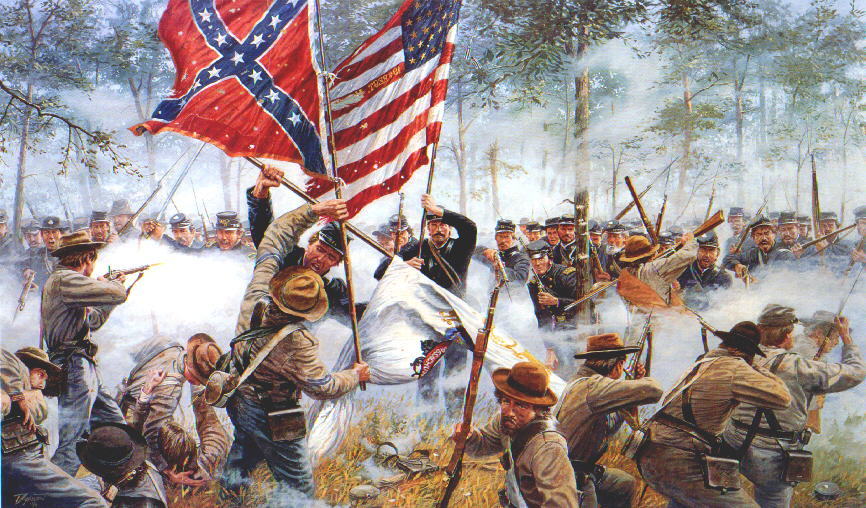In Part I of this series we took up the point that in modern times we are supposed to believe that Alabama did not have a state flag during the Civil War. In our search to see if this is true, we started with the star of the Alabama Secession Convention. Part II continues that story, with important revelations.
FLAG OF THE ALABAMA SECESSION CONVENTION
After the Convention began, debate lasted four days. Then, on the 11th of January, 1861, the Convention voted to secede. Up to this point meetings had not been open to the public, but after the vote the doors were opened. William Smith, the delegate from Tuscaloosa that we met in Part I, described the scene this way:
“When the doors were thrown open, the lobby and galleries were filled to suffocation in a moment. The ladies were there in crowds, with visible eagerness to participate in the exciting scenes. With them, the love songs of yesterday had swelled into the political hosannas of to-day.
“PRESENTATION OF THE FLAG.
“Simultaneously with the entrance of the multitude, a magnificent Flag was unfurled in the centre of the Hall, so large as to reach nearly across the ample chamber! Gentlemen mounted upon tables and desks, held up the floating end, the better thus to be able to display its figures. The cheering was now deafening for some moments. It seemed really that there would be no end to the raptures that had taken possession of the company.”
This was a beautiful ceremonial flag with two distinctly different sides. You can see a modern reproduction of this flag below:

The flag had a field of blue, the front side displaying Liberty with both a sword and a flag. On the reverse we see a rattlesnake within a cotton bush. The rattlesnake is a common symbol of American independence and willingness to fight for liberty, dating back to the 1760’s. The Latin words “NOLI ME TANGERE” are written on the reverse, meaning literally “Do not touch me.” The Latin expression was a warning against meddling or interference, and is a common translation into Latin translation of a famous Greek phrase, which actually meant , “cease holding onto me,” “let me go,” or “do not hold me.” This made clear Alabama’s intentions.
This flag was not completed in minutes, so the prevailing sentiment and outcome of the vote must have been predicted. In our own time it has become common practice to call this the Alabama Republic Flag, or the Flag of the Alabama Secession Convention. Unfortunately, popular writings also contain statements that lead one to believe that this was the flag of Alabama at Secession. It was not.
This was a newly created banner. In fact, William Smith himself spoke these words right after the presentation:
“Mr. President–I was not prepared for this surprise. I knew nothing of this intended presentation.”
Smith went on to talk about and describe the newly presented flag. Recall that just four days ago the Convention had resolved that the flag of Alabama would fly over the capital while the Convention was in session. This flag was different.
In fact, it was decided to fly this new flag over the capital building. It was displayed over the capital less than a month: On February 10th, 1861, It was damaged by high winds, taken down, and never flown again. The flag was largely ceremonial, not fabricated in such a way to withstand extended outdoor display. It is now stored in the Alabama Department of Archives and History. (Link is on archve.org ) Due to its delicate and very faded condition it is not available for public viewing.
So far as we can determine, this was a one-of-a-kind flag. We have no evidence that any others of its description were made. Yet, in the Convention Journal we read that right after the announcement of secession, “The roar of cannon was heard at intervals during the remainder of this eventful day. The new flag of Alabama displayed its virgin features from the windows and towers of the surrounding houses.”
Yes, the “new flag of Alabama” with its “virgin features” was suddenly flying around the city. In fact, Smith stated, “Guns had been made ready to herald the news, and flags had been prepared, in various parts of the city, to be hoisted upon a signal.”
We can see that the large flag presented at the Convention was different from the state flag, but that ceremonial flag does contain vital clues. Remember that Liberty is holding a flag in her left hand. That flag also has a blue field, with the word “ALABAMA” over a single star.
On page 121 of his History of the Debates of the Convention Mr. Smith has this description of the presentation:
“We accept this flag; and, though it glows with but a single star, may that star increase in magnitude and brilliancy, until it out-rivals the historic glories of the Star-Spangled Banner!”
It would seem the flag presented at the Convention has the new flag of Alabama on it, being held in Liberty’s hand. Fortunately, we have more information about this, covered in Part III, the final chapter of this story.

